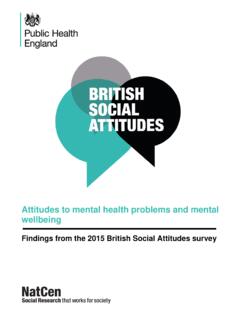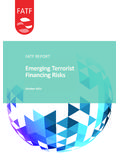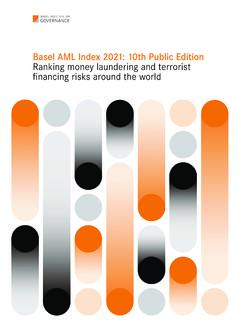Transcription of Religion - British Social Attitudes Survey
1 British Social Attitudes 36 | Religion 1. Religion Identity, behaviour and belief over two decades The past two decades have seen international conflict involving Religion and domestic religious organisations putting themselves at odds with mainstream values. Against this backdrop, we compare religious identification, behaviour and belief among the British public. We find a dramatic decline in identification with Christian denominations, particularly the Church of England; a substantial increase in atheism and in self-description as very or extremely non-religious; and very low confidence in religious organisations, but tolerance of religious difference.
2 Spotlight Over time, there has been a dramatic decline in the proportion of people who identify with Religious identity Christianity along with a (1983 2018). substantial increase in those with no religious affiliation, and a steady increase in those belonging to non-Christian faiths. Religious identity, 1983 2018. 100. 90. 80. 70. 60. % 50. 40. 30. 20. 10. 0. 19. 19 3. 19 4. 19 5. 19 6. 19 7. 19 8. 19 9. 19 0. 19 1. 19 2. 19 3. 19 4. 19 5. 19 6. 19 7. 19 8. 20. 20 0. 20 1. 20 2. 20 3. 20 4. 20 5. 20 6. 20. 20 8. 20 9. 20. 20 1. 20 2. 20 3. 20 4. 20 5. 20 6.
3 20 7. 8. 8. 8. 8. 8. 8. 8. 9. 9. 9. 9. 9. 9. 9. 9. 9. 99. 10. 1. 1. 1. 1. 1. 1. 1. 18. 0. 0. 0. 0. 0. 0. 0. 07. 0. 0. Christian No Religion Non-Christian faiths The National Centre for Social Research British Social Attitudes 36 | Religion 2. Overview Rise of the nones'. Most of the shift in the religious profile of the nation has been towards non-affiliation, with 52% of the public now saying they do not regard themselves as belonging to any Religion . Of these, most were simply not brought up with a Religion , with a smaller minority having lost a childhood faith.
4 Those who do not regard themselves as belonging to a Religion are increasingly secular, that is, likely to say they are very or extremely unreligious. The number of people with no Religion , who were not brought up in one, has increased from 11% in 1998 to 23% in 2018. Consolidation of attendance Two-thirds (66%) of people in Britain never attend religious services, apart from special occasions such as weddings, funerals and baptisms. The proportion that report they attend religious services less than monthly has decreased. The proportion that report they attend at least weekly, or less often but at least monthly, has remained stable at around 11% and 7% respectively.
5 Little time for Religion , but prepared to be tolerant Most people show little enthusiasm for institutionalised Religion , although there is evidence that the public are, in general, prepared to be tolerant of the faith of others. Almost two-thirds (63%) believe religions bring more conflict than peace. Under half (46%) have some or more confidence in churches and religious organisations, with 21% expressing no confidence at all . Most people have a positive, or at least tolerant view, of members of other religious groups, but have more reservations about extremism.
6 The National Centre for Social Research British Social Attitudes 36 | Religion 3. Authors Introduction David Voas Professor of Social Science It is widely accepted that various Social changes associated with at University College London industrialisation, the rise of liberal democracy, and science and Steve Bruce technology, have reduced the power, popularity and persuasiveness Professor of Sociology at the University of Aberdeen of Christianity in the West (Bruce, 2011). Precisely when one dates the start of decline depends on which facets of religiosity one chooses and how one measures them.
7 In Britain, church attendance has declined steadily since at least 1851, when a government count showed about half the population in church on a particular Sunday. The figure derived from recent clergy counts is around 6% (Brierley, 2017). In 1900 church membership was around 25%; it is now less than 10%. In 1900 more than half the age-relevant population attended Sunday schools; now it is less than 4%. Similar declines are visible in the use of religious offices to mark rites of passage. In the nineteenth century, around 90% of Scottish weddings were religious.
8 In 2017 the figure was 30% and in 2012 there were more humanist than Catholic weddings. Before the Second World War, the Church of England was baptising three-quarters of the English population; the figure now is 15% (Wilson, 2016; Bruce, 2019). Critics of the secularisation thesis have tried to counter this evidence in various ways. It is certainly true that migration to Britain of people from traditionally religious cultures in South Asia, West Africa and elsewhere has produced growth in non-Christian faiths, as well as in Pentecostal Protestantism. However, subsequent growth in charismatic and independent evangelical churches has not kept up with general population increase.
9 Paul Heelas and Linda Woodhead (2004) argued that contemporary, holistic or New Age' spirituality was filling the gap left by the decline of the churches, but their own research showed less than 2% of a typical small English town engaged in activities that could generously be described as spiritual and half of the participants in yoga, meditation, and various forms of healing were primarily concerned with physical and psychological well-being. We find little support for the argument that religious sentiment or need has not declined; it is just expressed in novel ways (Lyon, 2001).
10 Similarly, the suggestion that the British are believing but not belonging (Davie, 1994) is at odds with the findings described below (and see Voas and Crockett, 2005). Some of the disagreement over recent changes in the status of Religion comes from confusing popularity and notoriety. Religion is more newsworthy now than it was in the 1990s. The UK has been involved in wars in countries with predominantly Muslim populations and has suffered jihadi terrorist attacks: for example, on the London transport network in 2005 and at a Manchester concert in 2017. In addition, since the fatwa on author Salman Rushdie in 1989, the UK.





